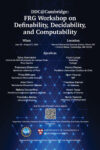28 - ANNOUNCEMENTS: DDC@Cambridge: FRG Workshop on Definability, Decidability and Computability
All day July 28, 2024-August 2, 2024 1 Oxford Street, Cambridge, MA 02138 USA  July 28—August 2, 2024Harvard University Science Center, Room 507This workshop is organized by the Principal Investigators of the NSF funded Focused Research Group on Definability, Decidability and Computability over Arithmetically Significant Fields DMS-2152304. The main topic of the workshop concerns questions of definability in the language of rings and its variants over algebraic extensions of rational numbers, function fields and local fields and the consequences for decidability of theories and computability of properties associated with these fields. Registration closed as of July 19. Speakers: - Sylvy Anscombe, Institut de Mathématiques de Jussieu–Paris Rive Gauche
- Philip Dittmann, Technische Universität Dresden
- Arno Fehm, Technische Universität Dresden
- Natalia Garcia-Fritz, Pontificia Universidad Católica de Chile
- Franziska Jahnke, Universität Münster
- Karen Lange, Wellesley College
- Hector Pasten, Pontificia Universidad Católica de Chile
- Bjorn Poonen, MIT
- Theodore Slaman, UC Berkeley
- Adam Topaz, University of Alberta
- Henry Towsner, University of Pennsylvania
Organizers: Valentina Harizanov, Barry Mazur, Jennifer Park, Florian Pop, Karl Rubin, Alexandra Shlapentokh. Sponsors: Harvard University, NSF.
| 29 - ANNOUNCEMENTS: DDC@Cambridge: FRG Workshop on Definability, Decidability and Computability
All day July 29, 2024-August 2, 2024 1 Oxford Street, Cambridge, MA 02138 USA  July 28—August 2, 2024Harvard University Science Center, Room 507This workshop is organized by the Principal Investigators of the NSF funded Focused Research Group on Definability, Decidability and Computability over Arithmetically Significant Fields DMS-2152304. The main topic of the workshop concerns questions of definability in the language of rings and its variants over algebraic extensions of rational numbers, function fields and local fields and the consequences for decidability of theories and computability of properties associated with these fields. Registration closed as of July 19. Speakers: - Sylvy Anscombe, Institut de Mathématiques de Jussieu–Paris Rive Gauche
- Philip Dittmann, Technische Universität Dresden
- Arno Fehm, Technische Universität Dresden
- Natalia Garcia-Fritz, Pontificia Universidad Católica de Chile
- Franziska Jahnke, Universität Münster
- Karen Lange, Wellesley College
- Hector Pasten, Pontificia Universidad Católica de Chile
- Bjorn Poonen, MIT
- Theodore Slaman, UC Berkeley
- Adam Topaz, University of Alberta
- Henry Towsner, University of Pennsylvania
Organizers: Valentina Harizanov, Barry Mazur, Jennifer Park, Florian Pop, Karl Rubin, Alexandra Shlapentokh. Sponsors: Harvard University, NSF.
| 30 - ANNOUNCEMENTS: DDC@Cambridge: FRG Workshop on Definability, Decidability and Computability
All day July 30, 2024-August 2, 2024 1 Oxford Street, Cambridge, MA 02138 USA  July 28—August 2, 2024Harvard University Science Center, Room 507This workshop is organized by the Principal Investigators of the NSF funded Focused Research Group on Definability, Decidability and Computability over Arithmetically Significant Fields DMS-2152304. The main topic of the workshop concerns questions of definability in the language of rings and its variants over algebraic extensions of rational numbers, function fields and local fields and the consequences for decidability of theories and computability of properties associated with these fields. Registration closed as of July 19. Speakers: - Sylvy Anscombe, Institut de Mathématiques de Jussieu–Paris Rive Gauche
- Philip Dittmann, Technische Universität Dresden
- Arno Fehm, Technische Universität Dresden
- Natalia Garcia-Fritz, Pontificia Universidad Católica de Chile
- Franziska Jahnke, Universität Münster
- Karen Lange, Wellesley College
- Hector Pasten, Pontificia Universidad Católica de Chile
- Bjorn Poonen, MIT
- Theodore Slaman, UC Berkeley
- Adam Topaz, University of Alberta
- Henry Towsner, University of Pennsylvania
Organizers: Valentina Harizanov, Barry Mazur, Jennifer Park, Florian Pop, Karl Rubin, Alexandra Shlapentokh. Sponsors: Harvard University, NSF.
| 31 - ANNOUNCEMENTS: DDC@Cambridge: FRG Workshop on Definability, Decidability and Computability
All day July 31, 2024-August 2, 2024 1 Oxford Street, Cambridge, MA 02138 USA  July 28—August 2, 2024Harvard University Science Center, Room 507This workshop is organized by the Principal Investigators of the NSF funded Focused Research Group on Definability, Decidability and Computability over Arithmetically Significant Fields DMS-2152304. The main topic of the workshop concerns questions of definability in the language of rings and its variants over algebraic extensions of rational numbers, function fields and local fields and the consequences for decidability of theories and computability of properties associated with these fields. Registration closed as of July 19. Speakers: - Sylvy Anscombe, Institut de Mathématiques de Jussieu–Paris Rive Gauche
- Philip Dittmann, Technische Universität Dresden
- Arno Fehm, Technische Universität Dresden
- Natalia Garcia-Fritz, Pontificia Universidad Católica de Chile
- Franziska Jahnke, Universität Münster
- Karen Lange, Wellesley College
- Hector Pasten, Pontificia Universidad Católica de Chile
- Bjorn Poonen, MIT
- Theodore Slaman, UC Berkeley
- Adam Topaz, University of Alberta
- Henry Towsner, University of Pennsylvania
Organizers: Valentina Harizanov, Barry Mazur, Jennifer Park, Florian Pop, Karl Rubin, Alexandra Shlapentokh. Sponsors: Harvard University, NSF.
| August | August | August |